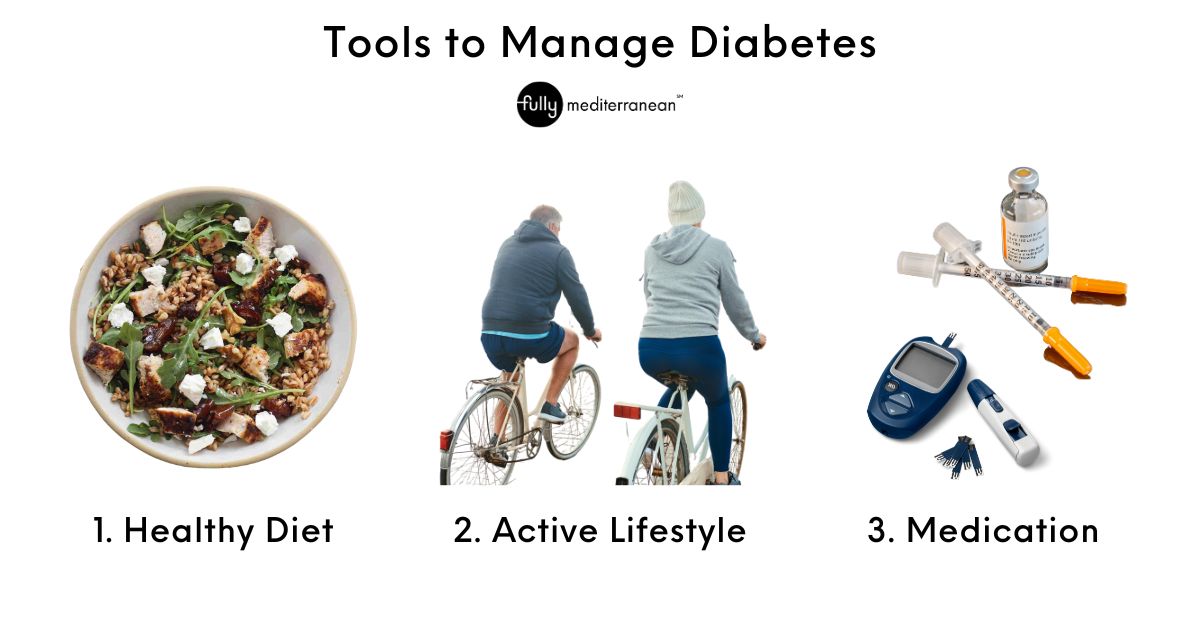Here’s what to know about the Mediterranean diet and diabetes. If you’re at risk of diabetes or if you already have it, the Mediterranean diet can be a wonderful tool to help you live your healthiest life.
Did you know that 37 million adults have diabetes? To add to that, 96 million adults have prediabetes in the US, and more than 80% of those with prediabetes don’t know they have it.
There are important steps you can take today to reduce your risk or improve your management of diabetes to feel your best. The Mediterranean diet is a sustainable, nutritious eating pattern that can have an amazing positive impact on your health long-term. Plus, it can bring some joy to your table as you prioritize social connection and delicious food. Let’s dive in to common questions we hear about the Mediterranean diet and diabetes.
What Is Diabetes?
First and foremost, it’s important to understand what diabetes is, and why the food you eat plays a role. Diabetes is a chronic condition that occurs when there is too much sugar circulating in the bloodstream over a long period of time. Normally, a hormone called insulin, works to help cells take in circulating sugar from the bloodstream for the cells to use.
For some people, the body stops producing enough insulin. For other people, the body stops responding to the insulin that is circulating in the bloodstream. This is called insulin resistance. Both of these problems with insulin cause the sugar levels in your blood to rise, leading to diabetes and potentially a variety of other health concerns.
Why Is Too Much Sugar In The Bloodstream A Problem?
The sugar that travels in the bloodstream is called glucose. We want some glucose moving throughout the body because it acts as quick energy for cells to perform their many functions. Too much glucose in the bloodstream becomes a problem because it can cause inflammation and tissue damage.
Over time this tissue damage can lead to:
- permanent nerve damage
- vision loss
- an increased risk of other chronic diseases
However, with the proper management and by being proactive with food choices, these complications can be minimized or avoided! That is the power of food.
What Are The Types Of Diabetes?
There are several types of diabetes, but the three that are most prevalent other than gestational diabetes are the ones below.
Prediabetes
Prediabetes is the period before developing diabetes when the body has slightly elevated blood sugar levels. This is a critical time to implement healthy diet and lifestyle habits that can prevent the progression of the condition.
Type I
Type I diabetes occurs when the body is unable to produce enough insulin to maintain normal blood sugar levels. In most cases, Type 1 diabetes develops during childhood and individuals with Type I diabetes will take insulin injections throughout their lives to regulate their blood sugar levels. Type I diabetes is caused in part by genetic and environmental factors.
Type II
Type II diabetes is when the body doesn’t respond appropriately to the insulin that is circulating in the body. There are important ways to reduce your risk of Type II diabetes or delay the onset of the disease. Lifestyle factors, such as a healthy, balanced diet and engaging in regular physical activity are important steps you can take. Some individuals with Type II diabetes will need to take insulin while others can manage their disease with just healthy diet and lifestyle behaviors.
Is The Mediterranean Diet Good For Diabetes?
The golden question…yes! The Mediterranean diet is a nutritious eating pattern whether you already have diabetes or you are at risk of developing the disease. The Mediterranean diet isn’t specifically designed for people with diabetes but it can absolutely be an effective tool to support balanced blood sugar levels.

Once you’re diagnosed with prediabetes or diabetes, there is still a lot that is in your control! Which can be a powerful feeling after a not so desirable diagnosis.
When you are at risk of developing diabetes or if you already have diabetes, it is important to eat regularly scheduled, balanced meals to prevent blood sugar spikes. Eating meals with protein and fiber slows digestion of the meal.
This means that your body will more slowly absorb the carbohydrates and have time to transport them throughout the body. The Mediterranean Diet Pyramid is a visual tool that can help you understand which foods to eat more and less of on the Mediterranean diet.
Does The Mediterranean Diet Work For Diabetes?
Yes, the Mediterranean diet can be part of diabetes prevention and management. There is a significant body of research that shows an important relationship between prediabetes and the Mediterranean diet. Greater adherence to a Mediterranean diet has been associated with reduced risk of developing diabetes and improved management of the condition.
Once you have diabetes, the goal is to keep your blood sugar levels within normal ranges as much as possible.
Tools to Manage Diabetes
The best tools to manage your diabetes include:
- a healthy diet – eating balanced, nutrient-dense meals regularly throughout the day
- lifestyle behaviors – engaging in regular physical activity
- medication – insulin and other medication that can help promote normal blood sugar levels

The Mediterranean diet includes nutrient-dense foods that are high in protein and fiber. These nutrients don’t spike your blood sugar after a meal and can help you feel full longer after eating.
Is The Mediterranean Diet Low Carb?
The Mediterranean diet is not a low carb diet. Instead we focus on building balanced meals that contain good sources of protein, healthy fats, fiber, and complex carbohydrates. We also help clients learn appropriate portion sizes which is an important part of managing diabetes. Together, these strategies help balance blood sugar levels.
It’s also important to note that a low carb diet isn’t necessary for individuals with diabetes, and can even be dangerous if you are using insulin, which functions to lower your blood sugar levels. You don’t want your blood sugar levels to get too low either.
Carbohydrates are an important source of energy for our bodies so we want to have appropriate portions of carbohydrates at meals. Instead of following a low carb diet, focus on learning serving sizes and choosing complex carbohydrates that have more fiber.
Diabetes-Friendly Mediterranean Diet Recipes
If you’re interested to start exploring the Mediterranean diet to help manage diabetes and/or your blood sugar, here are a few of our favorites. They are a great place for you to start.
These recipes are high in fiber and protein, and contain complex carbohydrates to help you maintain balanced blood sugar levels.

- Roasted Veggie Bowl With Green Tahini Sauce
- Egg Salad in Whole-Wheat Pita Pockets with Feta
- Sizzling Salmon and Spinach Salad
- Easy Mediterranean Grilled Chicken Salad
- Mediterranean Spaghetti Squash Shrimp Scampi
Ready To Start Your Mediterranean Diet Journey?
Have you heard of our online Mediterranean diet course? Living Fully Mediterranean Course is our comprehensive step-by-step program about the Mediterranean diet taught by registered dietitians.
It is a blueprint to the Mediterranean diet with 1:1 support. Whether you have diabetes or you want to implement healthy habits to reduce your risk of developing diabetes, this course would be a great resource for you.
The information provided in this article on diabetes is a general overview, so check with your healthcare providers or reach out if you have further questions about integrating the Mediterranean diet into your life.

0 Comments